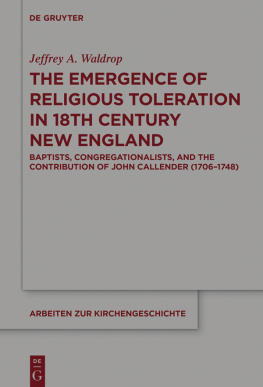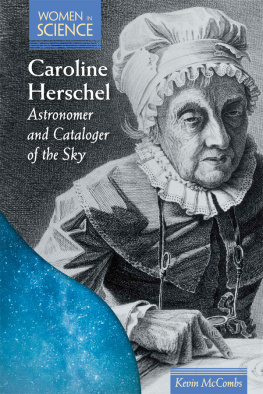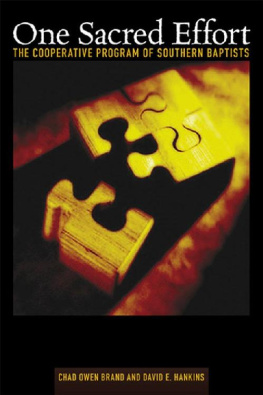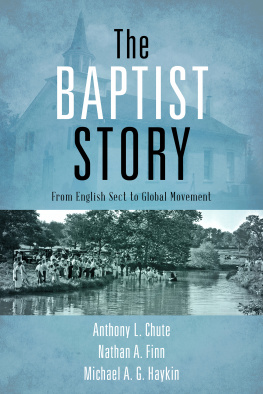Herschel H. Hobbs - What Baptists Believe
Here you can read online Herschel H. Hobbs - What Baptists Believe full text of the book (entire story) in english for free. Download pdf and epub, get meaning, cover and reviews about this ebook. year: 1964, publisher: B&H Publishing Group, genre: Religion. Description of the work, (preface) as well as reviews are available. Best literature library LitArk.com created for fans of good reading and offers a wide selection of genres:
Romance novel
Science fiction
Adventure
Detective
Science
History
Home and family
Prose
Art
Politics
Computer
Non-fiction
Religion
Business
Children
Humor
Choose a favorite category and find really read worthwhile books. Enjoy immersion in the world of imagination, feel the emotions of the characters or learn something new for yourself, make an fascinating discovery.
- Book:What Baptists Believe
- Author:
- Publisher:B&H Publishing Group
- Genre:
- Year:1964
- Rating:5 / 5
- Favourites:Add to favourites
- Your mark:
- 100
- 1
- 2
- 3
- 4
- 5
What Baptists Believe: summary, description and annotation
We offer to read an annotation, description, summary or preface (depends on what the author of the book "What Baptists Believe" wrote himself). If you haven't found the necessary information about the book — write in the comments, we will try to find it.
Short essays on the major doctrines which have formed the foundations of Southern Baptist life and thought.
What Baptists Believe — read online for free the complete book (whole text) full work
Below is the text of the book, divided by pages. System saving the place of the last page read, allows you to conveniently read the book "What Baptists Believe" online for free, without having to search again every time where you left off. Put a bookmark, and you can go to the page where you finished reading at any time.
Font size:
Interval:
Bookmark:

To
the Baptist editors
who render such a vital service in the
Lord's work and through whose co-operation
these articles were originally published
Basic in the principles of Baptists is the concept of the competency of each individual soul before God. This involves the priesthood of believers whereby every believer may read and interpret the Scriptures as he is led by the Holy Spirit. This truth within itself asserts that the contents of this volume are in no sense an official statement of what Baptists believe. They are the efforts of one Baptist to set forth what he believes that the Scriptures teach about certain elements of the Christian faith.
Nor does the author claim to present in these pages an exhaustive study of doctrine with respect to either topics or contents. In each case he has sought to state succinctly the meaning involved in certain selected elements of the faith. Related Scripture references are given to enable further study by those who desire to do so.
One of the most encouraging things about the current religious scene is a renewed interest in doctrine. It is one thing to believe. It is quite another thing to know what and why one believes. To say that one believes the Bible, and yet not know what it teaches, can hardly suffice in an age of critical analysis.
For this reason the author was delighted when the editor of one of the Baptist state papers requested that he write a weekly column under the caption, Baptist Beliefs. At this editor's suggestion this column was offered to all Southern Baptist editors of state papers. Forthcoming requests from most of these editors were most gratifying. In addition, requests were received from other Baptist publications, including The Australian Baptist and some publications in languages other than the English tongue. The author is grateful to these editors for their co-operation in this labor of love. He is further indebted to Broadman Press for its request that these articles be offered for publication in this present volume.
If this edition serves in any way to extend this ministry, the author will be grateful beyond measure. If it helps to strengthen even one reader in the faith and to stimulate him to further study in showing himself approved unto God, a workman that needeth not to be ashamed, rightly dividing the word of truth (2 Tim. 2:15), its purpose will be realized to the glory of God.
Sources frequently referred to in this work include the following: E. Y. Mullins, The Christian Religion in Its Doctrinal Expression; A. T. Robertson, Word Pictures in the New Testament; J. H. Thayer, A Greek-English Lexicon of the New Testament; Alexander Maclaren, The Gospel According to St. Matthew; Herschel H. Hobbs, Fundamentals of Our Faith; H. F. Stevenson, Titles of the Triune God; B. H. Carroll, An Interpretation of the English Bible.
HERSCHEL H. HOBBS
God the Father
The Bible does not seek to prove the existence of God. It declares him (Gen. 1:1). Belief in God, or a divine Being, is practically universal. The Bible dismisses the atheist with one terse verse. The fool [unthinking person] hath said in his heart, There is no God (Psalm 53:1). Note that he says it in his heart, the seat of his will. In his mind he knows better. But knowing it, he wishes that there was no God.
E. Y. Mullins gives us a definition of God. God is the supreme personal Spirit; perfect in all his attributes; who is the source, support, and end of the universe; who guides it according to the wise, righteous, and loving purpose revealed in Jesus Christ; who indwells in all things by his Holy Spirit, seeking ever to transform them according to his own will and bring them to the goal of his kingdom.
There are three basic names for deity in the Old Testament: God (Elohim, Gen. 1:1); Lord (Adonai, Josh. 7:10); Jehovah (Yahweh, Lord in KJV, Gen. 2:4). The first (2,550 times in O.T.) is a plural of majesty and power. The second (340 times in O.T.) is a term of personal relationship and is used often as a cognate of Jehovah. The third (6,823 times in O.T.) defines the God of Israel as the true God and as Redeemer (cf. Ex. 3:14; Isa. 42:8). In the New Testament, Theos corresponds to Elohim; Lord corresponds to Jehovah; Jesus means Jehovah is salvation.
God is one Person (Deut. 6:4) who reveals himself in three manifestations as Father, Son, and Holy Spirit. He is a personal Spirit (John 4:24). He has no material body, except in his incarnation in Jesus Christ, nor is he limited by or to matter.
Systematic theology speaks of the attributes of God, which are usually divided into seven natural and four moral qualities relating to God's person. The natural attributes are his self-existence (from no source outside himself); immutability (unchanging character, nature, and purpose); omnipresence (present in all space and time); immensity (not confined to space or its laws); eternity (past, present, and future equally known to him; he inhabits eternity, Isa. 57:15); omniscience (God knows everything simultaneously); omnipotence (unlimited power in keeping with his nature, character, and purpose). God's moral attributes are holiness (supreme moral excellence or the sum of his other moral qualities); righteousness (self-affirmation of the right as opposed to the wrong); truth (source and ground of all forms of knowing, and all objects of knowledge, Mullins); love (self-imparting nature of God seeking the highest good and complete possession of his creatures). Love is the attribute which envelops all others.
To conceive of God with respect to any one of his attributes apart from the others is to have only a partial picture of God. He reveals himself fully in and through Jesus Christ, who is interpreted to us by his Word and through his Holy Spirit.
The word trinity is not found in the Bible. It was first used in the second century A.D. by Tertullian to express the truth taught in the Scriptures. It denotes the triune (three in one) revelation of God as Father (Gen. 1:1; Matt. 6:9), Son (John 8:36), and Holy Spirit (Gen. 1:2; John 14:26).
This does not mean that we worship three Gods. The natural mind of man, attempting to express the concept of the manifold nature of God, turned to idols (Rom. 1). God revealed himself as one God existing in three manifestations. He always has been Father, Son, and Spirit. Thus God the Son existed before Jesus was born. Jesus is the Son of God (John 3:16); through faith we may become sons of God (John 1:12). Jesus is God's begotten Son; we can become his adopted sons. As Holy Spirit, God indwells his children.
An examination of the Scriptures reveals that God is present in his triune revelation in his activity in creation (Gen. 1:1-2; Psalm 104:28-30; John 1:1-3; Col. 1:15-16), revelation (2 Tim. 3:6; Heb. 1:1-2; 2 Peter 1:21), redemption (Heb. 10:5-15), and providence (Matt. 6:25-31; John 14:1-3,16-18; 16:13). This is best seen in redemption. The Father proposed it; the Son provided it; the Holy Spirit propagates it (Heb. 10:5-15; 2 Cor. 5:19; Heb. 9:14). All three persons of God were present at the baptism of Jesus (Matt. 3:16-17: note voice [Father]; Jesus [Son]; dove [Holy Spirit]) and in his resurrection (Rom. 1:4).
Think of history as a stage. In the Old Testament God the Father is on stage, with the Son and Holy Spirit in the wings. In the Gospels God the Son is on stage, with the Father and Holy Spirit in the wings. Thereafter, God the Holy Spirit is on stage, with the Father and Son in the wings. All three Persons are present at all times, with each being the more prominent revelation at given stages of history. It is a mystery beyond our comprehension, but it is a fact.
Font size:
Interval:
Bookmark:
Similar books «What Baptists Believe»
Look at similar books to What Baptists Believe. We have selected literature similar in name and meaning in the hope of providing readers with more options to find new, interesting, not yet read works.
Discussion, reviews of the book What Baptists Believe and just readers' own opinions. Leave your comments, write what you think about the work, its meaning or the main characters. Specify what exactly you liked and what you didn't like, and why you think so.










